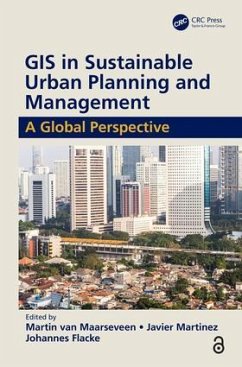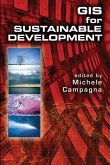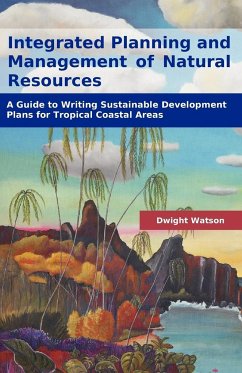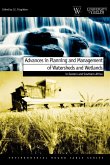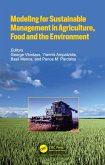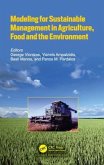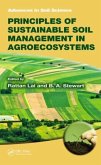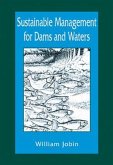GIS in Sustainable Urban Planning and Management
A Global Perspective
Herausgeber: Maarseveen, Martin van; Flacke, Johannes; Martinez, Javier
GIS in Sustainable Urban Planning and Management
A Global Perspective
Herausgeber: Maarseveen, Martin van; Flacke, Johannes; Martinez, Javier
- Gebundenes Buch
- Merkliste
- Auf die Merkliste
- Bewerten Bewerten
- Teilen
- Produkt teilen
- Produkterinnerung
- Produkterinnerung
GIS is used today to better understand and solve urban problems. This book explores and illustrates the use of geo-information in the planning and management of urban regions. The first part of the book addresses the concept of sustainable urban development, its different frameworks, and the many ways of measuring sustainability and its value in the urban policy arena. The second part discusses how urban planning is related to the shape of our cities, examines various spatial configurations of cities, the spread of activities, and the demands placed on different functions to achieve strategic…mehr
Andere Kunden interessierten sich auch für
![GIS for Sustainable Development GIS for Sustainable Development]() GIS for Sustainable Development74,99 €
GIS for Sustainable Development74,99 €![Integrated Planning and Management of Natural Resources Integrated Planning and Management of Natural Resources]() Dwight WatsonIntegrated Planning and Management of Natural Resources31,99 €
Dwight WatsonIntegrated Planning and Management of Natural Resources31,99 €![Advances in Planning and Management Advances in Planning and Management]() Advances in Planning and Management42,99 €
Advances in Planning and Management42,99 €![Modeling for Sustainable Management in Agriculture, Food and the Environment Modeling for Sustainable Management in Agriculture, Food and the Environment]() Modeling for Sustainable Management in Agriculture, Food and the Environment217,99 €
Modeling for Sustainable Management in Agriculture, Food and the Environment217,99 €![Modeling for Sustainable Management in Agriculture, Food and the Environment Modeling for Sustainable Management in Agriculture, Food and the Environment]() Modeling for Sustainable Management in Agriculture, Food and the Environment91,99 €
Modeling for Sustainable Management in Agriculture, Food and the Environment91,99 €![Principles of Sustainable Soil Management in Agroecosystems Principles of Sustainable Soil Management in Agroecosystems]() Principles of Sustainable Soil Management in Agroecosystems257,99 €
Principles of Sustainable Soil Management in Agroecosystems257,99 €![Sustainable Management for Dams and Waters Sustainable Management for Dams and Waters]() William R. JobinSustainable Management for Dams and Waters202,99 €
William R. JobinSustainable Management for Dams and Waters202,99 €-
-
-
GIS is used today to better understand and solve urban problems. This book explores and illustrates the use of geo-information in the planning and management of urban regions. The first part of the book addresses the concept of sustainable urban development, its different frameworks, and the many ways of measuring sustainability and its value in the urban policy arena. The second part discusses how urban planning is related to the shape of our cities, examines various spatial configurations of cities, the spread of activities, and the demands placed on different functions to achieve strategic objectives. This understanding, in a dynamic urban growth context, relates to the compact city view.
Hinweis: Dieser Artikel kann nur an eine deutsche Lieferadresse ausgeliefert werden.
Hinweis: Dieser Artikel kann nur an eine deutsche Lieferadresse ausgeliefert werden.
Produktdetails
- Produktdetails
- Verlag: CRC Press
- Seitenzahl: 366
- Erscheinungstermin: 9. Januar 2019
- Englisch
- Abmessung: 260mm x 183mm x 24mm
- Gewicht: 883g
- ISBN-13: 9781138505551
- ISBN-10: 1138505552
- Artikelnr.: 54994540
- Herstellerkennzeichnung
- Libri GmbH
- Europaallee 1
- 36244 Bad Hersfeld
- gpsr@libri.de
- Verlag: CRC Press
- Seitenzahl: 366
- Erscheinungstermin: 9. Januar 2019
- Englisch
- Abmessung: 260mm x 183mm x 24mm
- Gewicht: 883g
- ISBN-13: 9781138505551
- ISBN-10: 1138505552
- Artikelnr.: 54994540
- Herstellerkennzeichnung
- Libri GmbH
- Europaallee 1
- 36244 Bad Hersfeld
- gpsr@libri.de
Martin van Maarseveen is a full professor in Management of Urban-Regional Dynamics and Head of the Department of Urban and Regional Planning and Geo-Information Management at ITC, University of Twente, The Netherlands. He obtained an MSc degree with distinction in Applied Mathematics in 1976, and a PhD degree in Stochastic Systems and Control Theory in 1982, both at the University of Twente. From 1980 till 1989 he was a senior researcher in transport planning and traffic management at TNO, the Netherlands Organization for Applied Scientific Research, in Delft. In 1989 he returned to the University of Twente to become one of the founding fathers of the School for Civil Engineering & Management and Head of the Centre for Transport Studies. From 1995 till 2008 he was a full professor in Strategic Transport Planning and Sustainable Development. Since 2003 he is also a guest lecturer in Transport Planning, Modelling and Assessment at the University of Cape Town, South Africa. In his current position he focuses on the application of Geo-Information Science in the field of Urban Planning and Management in education, research and projects. He has a vast experience in international projects all around the globe, and is author of more than 200 scientific and professional publications. Javier Martinez is Assistant Professor in the Department of Urban and Regional Planning and Geo-Information Management at ITC, University of Twente, the Netherlands. He graduated as an architect from the Faculty of Architecture, Planning and Design (UNR) Rosario, Argentina and obtained his MSc degree in geo-information for urban planning from ITC, University of Twente. He received his PhD from the Faculty of Geographical Sciences, Utrecht University. Between 1999 and 2001, he worked Argentina in the Strategic Plan Rosario office (PER) designing its Urban Indicators System. He has published research papers and book chapters in the application of GIS and indicators for policy making, urban poverty, quality-of-life and intra-urban inequalities. From 2010-until November 2014 he was Co-Coordinator of the Network-Association of European Researchers on Urbanization in the South (N-AERUS). Since 2017, he is member of the board of directors of the International Society of Quality of Life Studies (ISQOLS). Johannes Flacke holds a Diploma degree in Geography (1994) from Ruhr-University Bochum in Germany. He received his PhD in Geosciences at the Ruhr-University Bochum in 2002 with a dissertation on information systems promoting sustainable land use based on spatial indicators. Before joining ITC at the University of Twente as Assistant Professor Spatial Planning and Decision Support Systems in 2007 he worked as a postdoc researcher at the Department of Urban and Regional Planning, TU Dortmund University. He has over 20 years of theoretical and practical experience in urban and regional planning in the global north and south and the development and use of geo-information and planning support systems. Fields of application have been urban land use planning, informal settlements, health and environmental inequalities, sustainable land management, climate change adaptation, hazard and risk management, and poverty alleviation and targeting. His research focuses on the transformation of urban areas into sustainable and resilient places for all. Main research interests are currently informed spatial decision making for urban planning in the global south, climate change adaptation planning at the local level, the application of collaborative spatial decision support systems in urban planning and micro-level modelling of urban dynamics.
Urban Planning and Management: Geo-Information Applied to Cities. The
Sustainable and Inclusive City. Towards Low Carbon Development. An
Exploration of Environmental Capital in The Context of Multiple
Deprivations. Development of Environmental and Health Indicators Related to
Inequalities. Sustainable Development by Means of a Collaborative Planning
Framework. Evaluating the Role of Public Spaces in Promoting Social
Interaction in Divided Cities. Are Socio-Economically Disadvantaged
Communities, Ill and Costly? Urban Quality of Life and Its Spatial
Distribution. City Morphology and Women's Perception of Travel. Children's
Perception of Their City Center: A Qualitative GIS Methodological
Investigation. The Compact-Competitive and Resilient City. Modelling
Informal Settlement Growth. Developing A Walkability Index for The
Assessment of Nodes in a Transit-Oriented Development. Modelling Urban
Growth. Multiple Criteria Bicycle Route Assessment Integrating Demand,
Supply & Stakeholder Perceptions for A Spatial Decision Support System.
Post Resettlement Dynamics of Socio Economic Pattern. National Urbanization
Policy Development and Implementation with The Emerging Spatial Development
Framework of Competitive and Complementary Cities. Performance Preferences
and Policies in Urban Water Supply. Modelling Urban Growth and Flooding
Interactions with Cellular Automata. Utilizing Volunteered Geographic
Information to Assess Community's Flood Evacuation Shelters. Towards
Equitable Urban Residential Resettlement.
Sustainable and Inclusive City. Towards Low Carbon Development. An
Exploration of Environmental Capital in The Context of Multiple
Deprivations. Development of Environmental and Health Indicators Related to
Inequalities. Sustainable Development by Means of a Collaborative Planning
Framework. Evaluating the Role of Public Spaces in Promoting Social
Interaction in Divided Cities. Are Socio-Economically Disadvantaged
Communities, Ill and Costly? Urban Quality of Life and Its Spatial
Distribution. City Morphology and Women's Perception of Travel. Children's
Perception of Their City Center: A Qualitative GIS Methodological
Investigation. The Compact-Competitive and Resilient City. Modelling
Informal Settlement Growth. Developing A Walkability Index for The
Assessment of Nodes in a Transit-Oriented Development. Modelling Urban
Growth. Multiple Criteria Bicycle Route Assessment Integrating Demand,
Supply & Stakeholder Perceptions for A Spatial Decision Support System.
Post Resettlement Dynamics of Socio Economic Pattern. National Urbanization
Policy Development and Implementation with The Emerging Spatial Development
Framework of Competitive and Complementary Cities. Performance Preferences
and Policies in Urban Water Supply. Modelling Urban Growth and Flooding
Interactions with Cellular Automata. Utilizing Volunteered Geographic
Information to Assess Community's Flood Evacuation Shelters. Towards
Equitable Urban Residential Resettlement.
Urban Planning and Management: Geo-Information Applied to Cities. The
Sustainable and Inclusive City. Towards Low Carbon Development. An
Exploration of Environmental Capital in The Context of Multiple
Deprivations. Development of Environmental and Health Indicators Related to
Inequalities. Sustainable Development by Means of a Collaborative Planning
Framework. Evaluating the Role of Public Spaces in Promoting Social
Interaction in Divided Cities. Are Socio-Economically Disadvantaged
Communities, Ill and Costly? Urban Quality of Life and Its Spatial
Distribution. City Morphology and Women's Perception of Travel. Children's
Perception of Their City Center: A Qualitative GIS Methodological
Investigation. The Compact-Competitive and Resilient City. Modelling
Informal Settlement Growth. Developing A Walkability Index for The
Assessment of Nodes in a Transit-Oriented Development. Modelling Urban
Growth. Multiple Criteria Bicycle Route Assessment Integrating Demand,
Supply & Stakeholder Perceptions for A Spatial Decision Support System.
Post Resettlement Dynamics of Socio Economic Pattern. National Urbanization
Policy Development and Implementation with The Emerging Spatial Development
Framework of Competitive and Complementary Cities. Performance Preferences
and Policies in Urban Water Supply. Modelling Urban Growth and Flooding
Interactions with Cellular Automata. Utilizing Volunteered Geographic
Information to Assess Community's Flood Evacuation Shelters. Towards
Equitable Urban Residential Resettlement.
Sustainable and Inclusive City. Towards Low Carbon Development. An
Exploration of Environmental Capital in The Context of Multiple
Deprivations. Development of Environmental and Health Indicators Related to
Inequalities. Sustainable Development by Means of a Collaborative Planning
Framework. Evaluating the Role of Public Spaces in Promoting Social
Interaction in Divided Cities. Are Socio-Economically Disadvantaged
Communities, Ill and Costly? Urban Quality of Life and Its Spatial
Distribution. City Morphology and Women's Perception of Travel. Children's
Perception of Their City Center: A Qualitative GIS Methodological
Investigation. The Compact-Competitive and Resilient City. Modelling
Informal Settlement Growth. Developing A Walkability Index for The
Assessment of Nodes in a Transit-Oriented Development. Modelling Urban
Growth. Multiple Criteria Bicycle Route Assessment Integrating Demand,
Supply & Stakeholder Perceptions for A Spatial Decision Support System.
Post Resettlement Dynamics of Socio Economic Pattern. National Urbanization
Policy Development and Implementation with The Emerging Spatial Development
Framework of Competitive and Complementary Cities. Performance Preferences
and Policies in Urban Water Supply. Modelling Urban Growth and Flooding
Interactions with Cellular Automata. Utilizing Volunteered Geographic
Information to Assess Community's Flood Evacuation Shelters. Towards
Equitable Urban Residential Resettlement.

